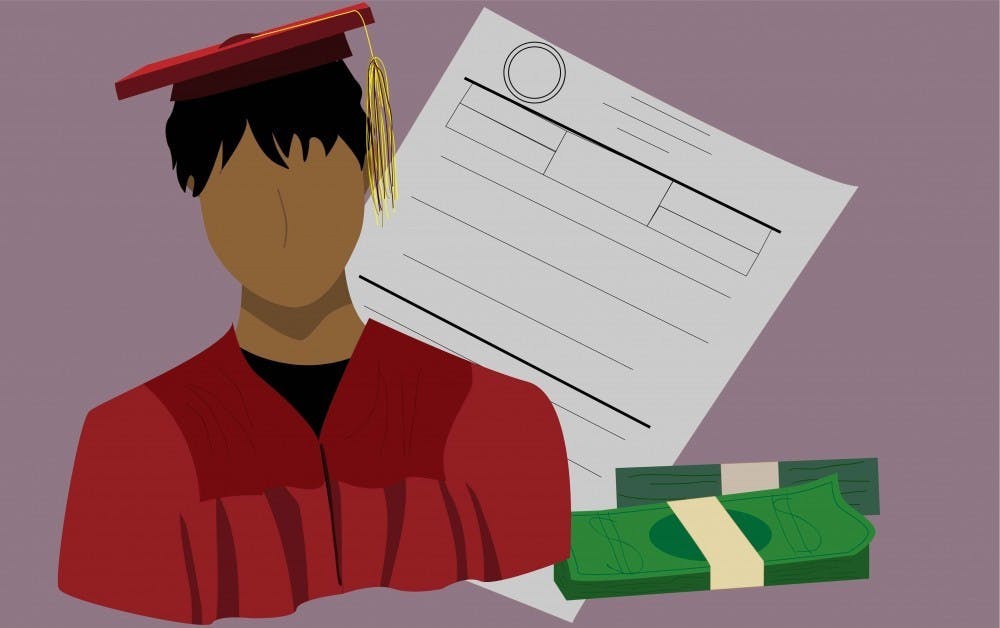Since Arizona voters passed Proposition 308, there has been an increase in the number of undocumented students able to enroll in colleges across the state. However, student recipients and advocates want to continue to inform Arizona residents about the benefits of Prop 308.
The bill grants in-state tuition if they attended a minimum of two years at an Arizona public or private high school or a homeschooling equivalent. Since it passed in 2022, eligible students' tuition have been reduced by over 150% by the start of the 2023 spring semester.
Maria Garcia, a first-generation student and senior studying political science and transborder studies, campaigned for the passage of Prop 308 with Aliento, a youth-led organization in Arizona that helps provide resources to undocumented and DACA students. She said she learned of the voter's decision while in the Aliento headquarters and felt disbelief.
"I just couldn’t believe that it had passed," Garcia said. "We felt like this is the first time something good has happened to our community."
Garcia said that before the proposition passed, she paid nearly $6,000 more in tuition at ASU because of her legal status and had to pay with various private scholarships.
"I didn't find out that I didn't have in-state tuition until my junior year," Garcia said. "I had to look at a lot of private scholarships, even the smallest one. My thought with even the smallest (scholarships) was if 'I can get multiple of those, they will amount to a bigger number.'"
READ MORE: Dreamers at ASU say Proposition 308 would expand access to higher education
Prop 308 is similar to other nonresident tuition bills around the country, such as California’s Assembly Bill 540 or Washington’s H.B. 1817. When the bill initially passed, Aliento said in a press release, "Today is a bright day in Arizona for our Dreamers and our state."
Angel Palazuelos, a senior studying biomedical engineering, said he also benefited from Prop 308’s passing and that his tuition at ASU was reduced at the beginning of the spring semester.
"I remember my friend called me and was like, 'Look at your finances -- go to your finances on MY ASU,' and I was like, 'What are you talking about? What’s going on?' and then I saw the new tuition rate and was excited, and it shows how far we have come in Arizona," Palazulos said.
Palazuelos and Garcia are paying for in-state tuition at ASU and are part of the 10,000 undocumented students receiving higher education in the State of Arizona, according to a 2023 report by the President’s Alliance.
In the same study, undocumented students make up around 1.9% of all students enrolled at a higher education institution. Many of these students are enrolled in either STEM or health-related fields.
While qualified current and future undocumented students are eligible for in-state tuition, José Patiño, the vice president of Education and External Affairs at Aliento, said he questions whether the universities and counselors are informing others about the eligibility.
"The issue is, are the universities and colleges doing the outreach to get people to know that they are eligible for the in-state tuition?" Patiño said, "How many students are we going to lose because they didn’t know they were eligible for in-state tuition?"
In 2006, Arizona voters approved Prop 300, which denied undocumented students in-state tuition. Patiño said that the law was like a barrier and discouraged many students from attempting to go to college, and not many high school advisors were able to advise undocumented students on how they could attend college.
Palazuelos said he was one of the students who was left in the dark, wondering how he could attend college.
"I remember walking to my counselor’s office my freshman year and asking her, ‘Hey, I'm undocumented. Am I going to be able to go to school?’… and her not knowing how to answer that question because she didn’t have the right information… I remember feeling down," Palazuelos said.
To educate and prevent this from happening more, Palazuelos, along with Aliento, have started to go to local high schools to help inform students and counselors on how undocumented high school students can be informed about possible eligibility status.
"Prop 308 is going to break the doors open for thousands of students," Patiño said, "It takes time, and it takes people. We have to continue to advocate and raise awareness."
Edited by Alysa Horton, Walker Smith, Shane Brennan
Reach the reporter at gnavar10@asu.edu and follow @GhadielN on X.
Like The State Press on Facebook and follow @statepress on X.




